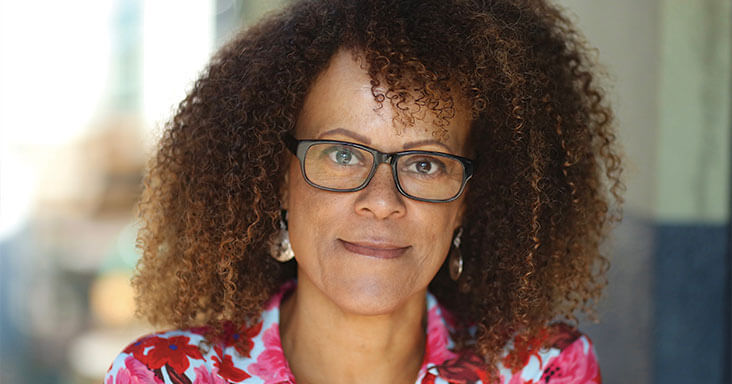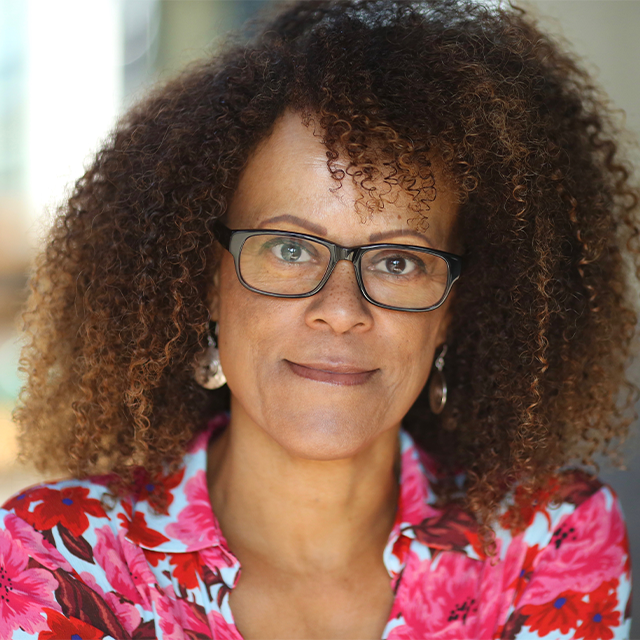
The house I grew up in is the house I lived in for 60 years of my life, that is, in the same house on the same street in the same city in the same country I call my own, ever since my parents bought it a few years after they arrived in the Promised Land in 1958, me cradled in Mum’s arms, soon to be despatched to childminders, while they worked double shifts so we could afford our own house in our own street surrounded by neighbours who wanted to hound us back to where we came from, of course, who wrote unrepeatable words on our front door until they bored of it and realised we weren’t budging, and as the years rolled on those self-same people were worn down by my parent’s never ending hellos and good mornin’s and good h-afternoons in their thick island accents, and their keeping-up-with-the jones’s perfect lawn out back and cultivated rose garden out front where it counted most, although in some stubborn cases, it took practically ten years for people to melt and stop for a chat
'over time we went from strangers to what was familiar, and what was familiar wasn’t seen as so foreign, and people would say to my parents, you lot are alright'
and over time we went from strangers to what was familiar, and what was familiar wasn’t seen as so foreign, and people would say to my parents, you lot are alright, it’s the others we don’t like, even though they’d never met any others, and some of our neighbours even became friends, such as Dad went down the pub with the men, and Mum went to bingo with some of the women, and the tide really turned in our favour when the Ugandan Indians moved into the street with their ‘funny clothes, weird religion and smelly food’, to be welcomed by some in our neighbourhood, not with neighbourly baskets of fruit and bunches of flowers, but with dead rats on the doorstep and excrement in the letter box, and rather than feel sorry for them, if I’m honest, we were grateful it wasn’t us because we’d already blended into the community, as my parents were fond of saying, we’ve blended into the community, Linda
whereas I’d not only blended but bonded with Marian a road away who snubbed me for a whole year when I tried to talk to her on the walk to the same secondary school into the same classroom and even onto our allocated seats in the same row of desks, her steaming snottily ahead, me trailing behind, willing her to trip up and break her nose for being such a bitch, until one dark winter’s afternoon we were walking home through the short-cut alley that wasn’t allowed and into the empty park when a man jumped in front of her from behind the boarded-up toilets and flashed his willy, which all girls had been warned about, seeing as it was a common occurrence back then, and she just froze while I was the one who took the initiative, ran forwards, grabbed her hand, dragged her out of harm’s way
that’s how I became best friends with Marian in 1972, Marian, who was so popular, so ‘with it’, with her David Bowie hairstyle, blue eyeshadow, hitched-up skirt and over-the-knee socks with lacy patterns, and once I was her friend, she defended me at school against those who called me names, and the boys who barged into me in the corridors so hard I fell down, and we began to spend all our spare time together in my bedroom, listening to my mum’s Stevie Wonder records or Dad’s Desmond Dekker albums on the portable record player she brought over because her parents didn’t want me in her house, and we’d spend hours trying on make-up and talking about the boys who fancied her, never me, until we took the No 15 to the end of the route, and discovered island boys at parties and shebeens, island boys, who flocked around me as well as her, who laughed at me because I didn’t sound black, they said, prompting me to tell them I didn’t know the colour of a person’s skin had a sound to it, and they liked that I was feisty, and me and Marian were hot property with them, especially as she liked them too and began to declare how once you’ve gone black, you can’t turn back
'we took the No 15 to the end of the route, and discovered island boys at parties and shebeens, island boys, who flocked around me as well as her'
and life was looking good, especially when we left school at 16, much to my parent’s dismay, blaming themselves for giving me too much freedom, left school to enjoy the swinging seventies because we’d missed the sixties, hadn’t we, got jobs at Woodman’s shop on the High Street, and really resented having to pay taxes just when we’d started having money to spend, it’s outrageous, we’d exclaim to the manager who handed us our wages in pound notes, shilling coins and pennies in a little brown envelope with a hand-written pay slip every Friday at closing time, most of which was gone after we’d trawled the shops up Carnaby Street first thing on Saturday, and then partied from last thing Saturday to the middle of Sunday
we had no idea, then, that we’d stay at Woodies until it shut down in 2010, that our whole working life would be spent in one shop, me shut away in the storeroom in an overall at first, which hurt, because Marian was straight off put on the tills and into a smart uniform, though I never made a fuss, as my parents had always advised me not to become an ungrateful troublemaker shouting from the rooftops, but to keep my head down, be polite, work hard, suffer in silence and be rewarded in heaven, until race relations improved and then I was allowed onto the shop floor and everything looked good until I fell pregnant with Paul after a one-night stand when I was too young to understand I’d lose my freedom just when I was getting it, if I didn’t insist on a condom, and I was lucky my parents didn’t kick me out because they were furious at first, didn’t talk to me for ages, and I realised how much I needed them to love me unconditionally, but I was supposed to do better than them and not end up a single mother at 17 and they were so upset, but what’s done is done, Mum said when she came round, we’re here for you, she said as she let me hug her, and they helped me out with Paul so I could still go out work and work at being a mother
which went well enough until Mum’s heart surprise-attacked her and won the fight, and every bit of pain I’d ever felt was thrown up in my grief, and I still miss her every day, and a few years after that Dad’s diabetes got the better of him and I still miss him every day, too, and then it was just me and Paul living in the same street in the same city in the same country I call my own
whereas Marian had her three by the time she was 26, moved into a council flat with Carlton two roads behind mine, and for over 30 years we’d meet at the junction, Monday to Friday, to walk to the bus stop to take the bus to work, easily chatting to each other because were we so close and in sync, whether it was about the kids, or the men who came and went in my life, or our various ailments as we grew older and slowed down because both of us had put on weight and mourned the loss of our waists, while sometimes Carlton’s shifts meant he could give us a lift, and I was always grateful to him for being a father figure for Paul when he needed one as a teenager and wouldn’t listen to me when I worried he’d end up locked up like some of his friends did, but instead Paul survived and went into retail at 16, like his mum, worked his way up from shop floor to deputy manager of a hardware store, married Lucy, had Lottie, his first child, which made me a grandmother, which was repeated another four times in the next decade which I loved, our family genes spreading out, seeing my parents in my grandchildren, me helping out when I retired, because I couldn’t take on another job after Woodies as it didn’t feel right and Marian was at that point suffering from depression after Carlton left her for a younger model half his age, and she stayed in bed most days
'I was always grateful to him for being a father figure for Paul when he needed one as a teenager and wouldn’t listen to me when I worried he’d end up locked up'
anyway, financially, like my parents, I wasn’t a spendthrift, could live on my small private pension until I could add the state one to it, the house was paid off and it didn’t take much to please someone like me with no grand ambitions firing me up which would only lead to disappointment, as my parents had warned me, but I did do up the house once I had time on my hands, cleared out the old papers and other rubbish stuffed into practically every draw and cupboard, just tipped them all in black rubbish bags when I got bored poring over each one, then gave the house a coat of paint, even signed up to the gym although I never actually made it through the doors, preferred watching television to wearing myself out on a running machine, and overall I’d say my life was looking good
until I got a knock at the door one Friday morning from two officials demanding I accompany them to an immigration centre, ordering me to get ready quickly, escorting me like a criminal to what looked like a police car, wondering who was watching, feeling scared when they put me into an interrogation room where they told me I was an illegal immigrant, they said, because I didn’t have a passport to say otherwise, which was a big relief to me because of course they were wrong, I told them, blurting it out, almost laughing, it’s a case of mistaken identity, I said, I’ve been here all my life, I said, living in the same house in the same street in the same city in the same country that’s my own
they replied that changed immigration rules and nationality legislation was designed to catch out illegal immigrants and they were just catching up, you now needed a British passport to prove your right to be here in the United Kingdom of Great Britain, they said, a passport to prove your right to a state pension, your right to health care on the NHS, your right to breathe pure British air, they said, and if I couldn’t, I’d have to return any money I’d gotten under false pretences and yes, they’d take ownership of my home, and yes I’d be deported back to my home
this is my home, said, I left the island when I was nine months old, and they said, it’s your word against the law of the land, isn’t it, and as far as we’re concerned you’re here illegally unless you can submit documentary proof of your right to reside, which I didn’t have and probably never had, unless it was in the stuff I’d thrown away, and they kept saying I had to provide documentary proof by a certain date, but I’m not an illegal, I said, I’m not one of them, the Poles or Romanians, the Arabs or Africans, humiliating myself by crying, barely able to speak, but they said again and again that I had to provide documentary proof, documentary proof, documentary proof, like they were robots, not wanting to hear my story, not caring about me living all my life in the same house in the same city in the country that’s my own, and for the first time in my life I felt so helpless, so weak, so scared, that when they let me go, I stood outside the centre and couldn’t walk without shaking like I had Parkinsons, I just crumpled down until I was slumped on the pavement in tears, wishing I’d taken Paul’s advice and got a mobile phone for him to come and collect me
'I stood outside the centre and couldn’t walk without shaking like I had Parkinsons, I just crumpled down until I was slumped on the pavement in tears'
it took me seven buses, three tubes and four hours to get home, I was so disorientated, I called Paul who told me to calm down so he could hear what I was saying, speak slowly, Mum, he said, what on earth has happened, Mum, he said, I’ll come over, Mum, he said and as soon as he understood the problem, he got a solicitor for me and we sat in his office that very afternoon listening to him say that Commonwealth citizens had been given indefinite leave to remain in 1971, but that without a passport, I had to prove I came before then, he said there were thousands like me, some had already been deported back to the countries they’d left as children, some lost their homes and had their housing benefit taken away and were sleeping rough, some had lost jobs and couldn’t get new ones without a passport, some were being denied health care services and untreated were dying, he said he charged £100 a hour and I’d have to rally everyone who knew me from before 1971 and get all kinds of records and fill in complicated forms and if I did this, I might be one of the lucky ones and I remember thinking this was a nightmare, a bad dream because how can this happen to someone like me?
----------------------------------------------------------------------------------
Bernardine Evaristo OBE is the pioneering author of eight books and numerous other works that span the genres of novels, poetry, verse fiction, short fiction, essays, literary criticism, and radio and theatre drama – including guest-editing Issue 63 of Mslexia in 2014. Her writing and projects are based around her interest in the African diaspora. She is Professor of Creative Writing at Brunel University London and lifetime Vice President of the Royal Society of Literature. Her novel Girl, Woman, Other won the 2019 Booker Prize.
----------------------------------------------------------------------------------


